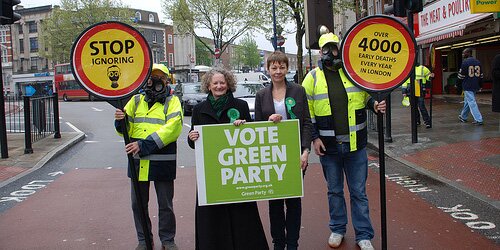What would you ask the Labour leader candidates?
9:27 am - June 13th 2010
| Tweet | Share on Tumblr |
After two Labour leadership hustings I have a rough idea of the main themes as well as many policy positions of all the five candidates.
I plan to write more on that soon.
But I am also planning to do interviews with some or all of the candidates and would like your thoughts on what questions they should be asked.
As a guide, there’s no point asking broad questions like: ‘do you believe in socialism or capitalism’, or rhetorical ones: ‘do you think Tony Blair was (a) rubbish, (b) a war-criminal?’ etc.
I think policy related questions that specifically ask then to address tightly defined issues would work best.
So… what would you like to ask the candidates?
| Tweet | Share on Tumblr |  |
Sunny Hundal is editor of LC. Also: on Twitter, at Pickled Politics and Guardian CIF.
· Other posts by Sunny Hundal
Story Filed Under: Blog ,Labour party ,Westminster
Sorry, the comment form is closed at this time.
Reader comments
I would ask the Labour leadership contenders if they would be willing to re-amend the constitution so there was a democratic (membership wide) policy making process, there is a reason Labour have lost 250 000 members, what better way to tune back in with those that they’re supposed to serve!
With reference to this excellent article in the New Statesman (http://www.newstatesman.com/uk-politics/2010/06/pluralist-party-labour) – how would you describe yourself – a pluralist or a tribalist?
Precisely – what is your position on FPTP or its alternatives such as AV, AV+ or STV (for example)? How do you expect to be voting in the forthcoming referendum? Will you be campaigning with large parts of the Conservative Party for retention of FPTP (because it delivers ‘strong government and decisive results’ or that PR results in ‘coalitions which are never good for the country’) ?
Several of you recent statements have been designed to woo Party members by saying how important they are in the Party policy making and ‘getting the vote out’ machines. What statements and critically, actions over the last 15 years would you highlight as evidence of your long-standing belief in the essential role of Party members?
Are you concerned or relieved that ID cards now appear to be consigned to history?
As it highly likely in the future that Labour may need to form a coalition with other parties (Lib Dem, but also other minority parties such as Green, PC, SDLP, SNP etc) – what would you tell us about your approach to forging and maintaining such coalitions?
Are you willing to publically make the case for more taxes to fund public services, something Labour was very shy of doing during its 13yrs in office?
What were you doing on that day back in 2003 when 2 million people protested against the Iraq war?
Given the pressure on the public services right now – as highlighted by VS above – at what thresholds would you set the upper tax limit of 50% and personal allowance below which people do not pay tax? Also – which statement comes closest to your views of the tax credit system… is it “a clever and fair way to help people out of the poverty trap and get people into paid employment” or “a bureaucratic attempt to make the tax system fairer but which badly needs simplification”?
Mr Miliband (D),
Announcing your candidature, you stated that one “judge[s] a country by the condition of the weak“. With this in mind, how do you defend your attempts to smother evidence relating to the “cruel, inhuman and degrading” treatment meted out to Binyam Mohamed (a decidedly weakened man)?
Mr Miliband (D),
Recently, you’ve claimed the Labour Party establishment has been “punished enough” over Iraq. What “punish[ment]” was this?
Mr Balls,
In a recent Telegraph interview, you gave the admission that officials told things that “w[eren't] really true” in the build-up to Iraq. Why, then, did you oppose inquiries into the war’s conduct (on 31st of October, 2006, and 11th June, 2007)?
Mr Burnham,
Why not just get out of our lives?
Some good questions so far.
What do you think was been Labour’s greatest success since 1997? How do you intend to build upon it?
What do you think was Labour’s greatest mistake since 1997? How do you intend to avoid similar screw ups in the future?
Why do you think Labour performed less well in 2010 than 2005?
P.S. Obviously I know how some of the candidates would respond to some of my questions, I just think a side-by-side comparison would be interesting.
Will you commit to supporting the results of the secession referendum to be held in Southern Sudan next year, and should it return a yes vote will you put pressure on the UK & US governments to recognise the results formally and immediately?
Cross-posted from “Labour Uncut”
One way in which this site could help is by asking the candidates if they believe, as Professor Conor Gearty does, that social democracy is dead. And if they don’t answer, ask them again and again until they do.
If they agree with Gearty ask them precisely which political space they wish to occupy that the co-alition partners, together or separately, couldn’t occupy quicker and better.
If they disagree with him ask them to explain why he’s wrong, and whether the Party as they envision it ought to make room for people like him, hostile to its fundamental reason for being, and if so, why.
The Blairite consensus was forged by the combination of a charismatic (and therefore unaccountable) leader and the fact that by the mid-1990s people no longer hated the Tories – they pitied them, which electorally is far more dangerous. And that process took 15 years and more.
The omens are not good – across Europe the parties of the Socialist (i.e. social-democratic) International are in free fall.
My own view is that whoever wins this contest will be lucky to achieve as much as Neil Kinnock did.
Should the NHS be changed to be simply a commissioner of healthcare and only be responsible for pay for services from market of healthcare providers? In short, should NHS providers (hospitals) be privatised?
1) Are you a feminist?
2) Describe feminism.
I’ve previously suggested a number of hottish topics:
- energy security
- food security
- climate change
- social mobility and what to do about it
- affordable housing
- reform of higher education
- supine v collegiate cabinets
- financial services regulation + asset-price bubbles
- bringing the NHS up to standards in other west European countries
- wars of liberal intervention
- sorting out the MOD
- productivity and salaries in the public sector
- rectifiying the high tax rates in the transition from benefits to work
- airport expansion
- political spin
A few more:
- unacceptably high rates of adult literacy and numeracy problems
- persisting skills gaps
- the future of PFI
FWIW I think voters are more impressed by candidates addressing policy issues of practical concern than engagements with high-flown ideology.
1) Are you a feminist?
2) Describe feminism.
Very good! That could also work for “liberal”, “socialist” and “decent human being”.
Mike Killingworth,
You’re talking about the same Conor Gearty who blogged in 2008:
“Expect a great shift in our language towards equality and fairness: socialism may not be back yet, but social justice is.”?
He seems to be in favour of social democracy to me (despite acknowledging previous failures of democracy and socialism).
Could you provide some evidence of opposition to it?
Cheers.
I suggest two related questions:
Should central banks be independent of government?
Would you be willing to raise the inflation target for a defined period as part of a package to reduce private sector indebtedness?
[19] My bad. It’s actually John Gray in the current London Review of Books
No doubt the coalition will be under attack as spending cuts begin to be felt, and some Liberal Democrats may cross over to Labour. The aim of these defectors will be to renew social democracy; but that is gone for good, and adopting a style of politics inspired by nostalgia for an irretrievable past will leave Labour stranded on the margins along with the Tory right
Are you sorry? If so what for and why did you do it or not do anything to prevent it?
Whilst delivering positive laws (eg legal gay partnerships), the post 1997 Labour governments implemented many illiberal measures. How would the candidates ensure that Labour is a liberal party in the future, a party that can resist populist and reactionary influences?
What would you do with the bailed out banks?
How scared are you of Rupert Murdoch and why?
Is there room for John Prescott in a future Labour government and why?
Will you apologise to the people of Iraq on behalf of the Labour Party for their illegal, disgusting war?
You may be sorry you asked me this… I have a *lot* of specific questions I’d like answered.
Since directors are supposed to protect shareholders (and employees and customers) by supervising companies closely, will they encourage corporate accountability (and diversity at senior levels) by limiting directorships to one per person, since they should be classed as full-time jobs?
In the same vein, will they limit membership of parliamentary committees to, say, five per MP, so that the committee members can do their jobs properly and fulfill their duties to the public?
Will they replace MP’s second homes allowances and expenses with a system less open to abuse, such as a government-owned hotel for MPs, and government-owned, civil-service-run constituency offices? If they’ll continue the current system, how will they crack down on abuse?
Since we have a housing shortage, will they be bringing in any sort of schemes to boost the amount of social housing available, such as replacing paying out housing benefit to private landlords with using that same housing benefit to pay mortgages to buy homes to turn into social housing?
Will they commit to a actually *building* social housing?
Will they be doing anything truly revolutionary, such as bringing in land rationing in areas with extreme housing shortages, and/or only selling to locals, and/or blocking people from building or buying second homes/holiday homes/investment properties in those areas?
Will they be turning pensions into a proper welfare benefit by means-testing them, and also de-coupling them from people’s NI contributions (which discriminates against women, migrants, and the disabled) and using the money saved to raise them to a higher level that people can actually live on?
Will they be bringing in compulsory audits for companies to force them to comply with laws like the Equal Pay Act and the various anti-discrimination acts, with punishments if they don’t have equal pay and/or a representative workforce (at all levels)? Many of these laws have been on the books for decades, but they might as well not be there at all if they’re so rarely enforced.
A lot of the voters’ unhappiness has been related to the out-of-touch, careerist political elite class in the ‘Westminster bubble’. Will they commit to term-limits for, say, MPs, MEPs, local councillors, mayors, etc? If so, what would those term limits be?
Bearing in mind that social inequality does the real damage, and it’s relative poverty not absolute poverty that matters, will they limit pay ratios to, say, twenty times minimum wage? (Or some similar scheme.) Will they do that in the private sector as well as the public sector? And if not, why not?
Societies are judged by how they treat the weakest members. Will they raise benefits to above the poverty level in this country?
Most adults and children in this country who live in poverty live in ‘working-poor’ households. What about the minimum wage, will they raise that above poverty level too?
Will they bring in an amnesty scheme for immigrants and asylum seekers?
How will they reduce the number of people, especially vulnerable people, being sent to jail?
Will they scrap the punitive back-to-work schemes in favour of re-education schemes that people choose for themselves, even if that means paying benefits to people studying full-time for several months or even years (to get a degree, for example)?
Instead of punishing current students with huge amounts of debt, will they fund University qualifications by charging older, wealthier graduates a wealth-tax, and use that money to provide free University education to the poorest students, and some sort of subsidy to most?
I could go on, but this is probably far too liberal and egalitarian for the Labour party.
Thanks for some excellent questions – keep them coming.
In response to some of the answers I know already…
#3 – all the candidates have said they are committed to AV, and none have argued in favour of FPTP, though Andy Burnham says that Labourites need to accept that it might hurt the party. He’s the least enthusiastic. Ed Miliband the most, and has said he would actively campaign for voting reform. None of the candidates are for PR.
#7 – all have said they wanted a bigger proportion of tax rises to cut the deficit than spending cuts.
You said ‘keep them coming’, and as there were some questions that I forgot to ask in my previous comment, here are some more…
Equality matters, and I think the government should lead on that issue, so what will they do to make Parliament and the various political parties more equal at all levels, in as many ways as possible?
Will they bring in minimum requirements (percentages or numbers) for women and other disadvantaged/minority groups in parties and/or local/national government, and if so, what sort of scheme do they favour?
Will this include PPCs, MPs, and cabinet members? Will it also be applied to local government? What about the Welsh and Scottish parliaments, and Northern Ireland? What about MEPs? If not, why not?
Will they be in favour of pro-equality shortlists, and if so, what form would they take — a central-office-run list of candidates, or perhaps local-office-run multiple-candidate lists?
We have a lot of blended families today, and the nuclear family is looking more and more like a 1950′s dream to many. Will they recognise this by changing ‘maternity leave’ to ‘family leave’, and allowing far more people to be included in it — Mums, Dads, step-relatives, older siblings, grandparents, aunts, uncles, friends, etc?
In 2008/09, it cost about £45,000 per year (in England) to keep a prisoner in jail. Instead of building new jails, will they spend more money on crime-prevention strategies to keep people out of jail, including things like child and adult education, child and adult mental health services, child and adult social workers, and drug rehabilitation programmes? If not, why not?
Will they improve education and rehabilitation for prisoners whilst they are in jail, too? If not, why not?
Many service personnel have difficulty adapting back to civilian life after leaving the service. What will they do to support service personnel not just while they are in the services, but throughout their lives?
Rape conviction rates are very low, about 6%. What will they do to help increase conviction rates for rape and sexual assault?
What will they do to help educate the publice about rape and sexual assault myths, and to prevent victim-blaming, especially since these unhealthy beliefs can help abusers justify their abuse, and also allow abusers to escape justice by playing into these unhealthy beliefs and prejudices?
What will they do to prevent so-called ‘domestic’ violence? What will they do to increase victims’ protection against abusers who commit ‘domestic’ violence and other forms of abuse against their partners?
Will they continue to talk about ‘cracking down’ on ‘benefits cheats’, or will they recognise that this is discriminatory and damaging language to use against vulnerable people, who are for the most part entirely honest and honestly entitled to the benefits they claim?
In the same vein, will they continue to talk about asylum seekers, refugees, immigrantrs, and economic migrants in derogatory and xenophobic language, which plays into the hands of parties like the BNP, or will they truly try to promote equality and acceptance by using more respectful language?
Will they respect the humanity, human rights and civil liberties of asylum seekers, refugees, immigrants, and economic migrants in this country, and seek to repeal laws that breach that?
Will they only promote laws that respect the humanity, human rights and civil liberties of everyone in this country? Will they seek to repeal laws that breach that?
What will they do to combat the increasing Islamophobia in this country?
What will they do to preserve the separation of Church and State, especially in an environment where many different religious groups may be a threat to secularism in this country, in various different ways?
What will they do to promote energy efficiency in the country’s existing housig stock? What about in new-build homes?
What about energy efficiency in commercial properties and in industry?
What about energy efficiency in public buildings and in the public sector?
Fairness seems to be the most important factor for wages. Will they propose measures to link senior levels’ pay to everyone else’s pay, so that if the people at the top award themselves a 15% pay rise, they have to award their staff the same rate, or if they ask staff to take a 5% pay cut, senior staff also have to take a 5% pay cut?
Will they take steps to make companies more stable by making them link bonuses to long-term performance, say, over a five-year period, for example?
If more Brits are going to find it to harder to buy their own homes, will they bring in measures to increase protection for tenants, and increase tenants’ rights?
If unemployment is going to rise, will they bring in measures to protect debtors against bailiffs and loan sharks?
Will they set a maximum for how high interest rates and financial penalties on loans and credit cards and overdrafts and hire-purchase agreements can go?
Will they tighten up the rules for utility companies, to ensure that all customers pay the same rate for their gas, electricity, or water, whether they pay by meter or by direct debit? Will they make utility bills more transparent and easier to understand?
Will they take any measures to make retail banks fairer to poor customers, by making them offer the same range of services (e.g. debit cards, small overdrafts, cheque books) to all, and making them offer fairer interest rates, and less punitive fees and charges?
Will they take measures to crack down on national and international tax evasion by companies? If so, what sort of measures?
What happened to that idea to empower pension holders to have a say in what their pension gets invested in and indeed dis-invested in? Moreover wasn’t their a suggestion that fund managers should be required to forge some sort of democratic link between the people whose money they are managing and the decisions taken (eg bonus decisions) at the AGMs of corporations that the funds are invested in? What do the five candidates think happened to these proposals and would they resurrect them?
and yes – and thanks for the info on #3 and #7, Sunny.
I’d like to ask the candidates why Labour signed up to the Lisbon Treaty, which limits and restricts worker’s rights and stops our government from nationalising industry, and why, if the candidates support workers and ordinary people in this country they didn’t oppose this and/or ask for a referendum? How can we trust any potential leader of the Labour party given that they’ve signed so many of our freedoms away to Brussels?
As per any job interview ask them what they contributed to Labour’s great achievements 1997 – 2010, 50 of which are set out here: http://twitter.com/LabAchievements and on Lord Toby Harris’ blog from which they were drawn.
Why are high housing prices good, and how do you propose to extend the ability to own your own home to the lower middle and working classes?
Reactions: Twitter, blogs
-
sunny hundal
RT @libcon: What would you ask the Labour leader candidates? http://bit.ly/c54Gop
-
John West
RT @sunny_hundal: RT @libcon: What would you ask the Labour leader candidates? http://bit.ly/c54Gop
-
Tweets that mention What would you ask the Labour leader candidates? | Liberal Conspiracy -- Topsy.com
[...] This post was mentioned on Twitter by John West, sunny hundal. sunny hundal said: RT @libcon: What would you ask the Labour leader candidates? http://bit.ly/c54Gop [...]
Sorry, the comment form is closed at this time.
NEWS ARTICLES ARCHIVE























